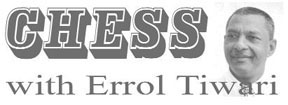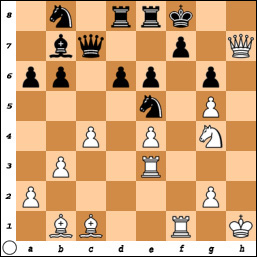 The word stalemate has its origins in chess. It represents a drawing position in which only the king can move, and although not in check, can move only into check. The word represents a deadlock, and it is commonly used in the circumstances of human affairs, and international relations. The word is apt to describe the current disappointing circumstances of the Guyana Chess Federation (GCF) General Meeting.
The word stalemate has its origins in chess. It represents a drawing position in which only the king can move, and although not in check, can move only into check. The word represents a deadlock, and it is commonly used in the circumstances of human affairs, and international relations. The word is apt to describe the current disappointing circumstances of the Guyana Chess Federation (GCF) General Meeting.
Since it was elected in February 2014, the current chess administration has not held an annual general meeting. The AGM is required by the chess constitution to be held annually not later than March each year. The constituted body, therefore, is illegal. However, the financial business of the Federation is still being conducted. Monies for tournaments are collected, sponsors are being encouraged to contribute and cheques are being signed. It’s business as usual, regardless. It seems as though there is no regard for the law and legal correctness. How can this ridiculous mishap be remedied?
I would assume one of the ways of saving some face is to announce a date for the AGM forthwith. The alternative is to offer the administration’s resignation. There is no joy in frustrating an entire chess community, barring a small number, chess players and non-chess players alike, who view it as within their interest of allowing things to continue as they are.
My grandmother was fond of saying, there is more in the mortar than the pestle. The notion of just equilibrium should be established. And to do so we should have a general meeting to elect a president and his or her

White to play and win
White played: Rh7+ Kxh7 Qe7+
officers. The column suspects there is the least intention of restoring order and if this is not done, it may haplessly go unnoticed. Should there be a new president one should not expect a redress of his grievances, the fulfillment of his desires and the triumph of one over the other. It’s not going to happen. In this instance, the column speaks unequivocally of Frankie Farley with whom I have been acquainted for a few decades. Farley does things by the book, literally, and the word “arrogance” has no existence within his selective vocabulary. He prefers the subtle manoeuvre to the frontal attack. It’s evident in his chess games. The mature chess players among us have dubbed him a modest man, who conducts himself with circumspection. His diplomacy is likened to, as Kissinger once wrote, a “circuitousness which is a symbol of certainty.”
On the international circuit, the chess world’s eyes are trained on the elaborate Olympiad, at which 170 nations participated in 2014, and the sensitive World Championship match. The Olympiad takes place in Baku, Azerbaijan, at the beginning of September, while the world championship match is scheduled for Manhattan, New York in mid-November. Both events elicit importance.
China is the current Open Olympic gold medalist having won in 2014, at the last Olympiad. The Chinese team beat Hungary by a two-point margin with India taking the bronze medal. It would be interesting to witness the finish of the competitive tournament. Much more startling would be a likely clash between the Norwegian world champion Magnus Carlsen and Russia’s Sergey Karjakin, his world championship challenger. Such a clash would be considered a dress rehearsal for the ultimate world championship meeting. Both players have opposed, and defeated each other, with Carlsen winning the battle of the minds narrowly. The Olympic game can only happen if Karjakin is on the Olympiad team, and if he plays Board One for Russia. We will wait and see.
There is also the tiny matter of the world championship returning to Russia from the West if Carlsen loses.




